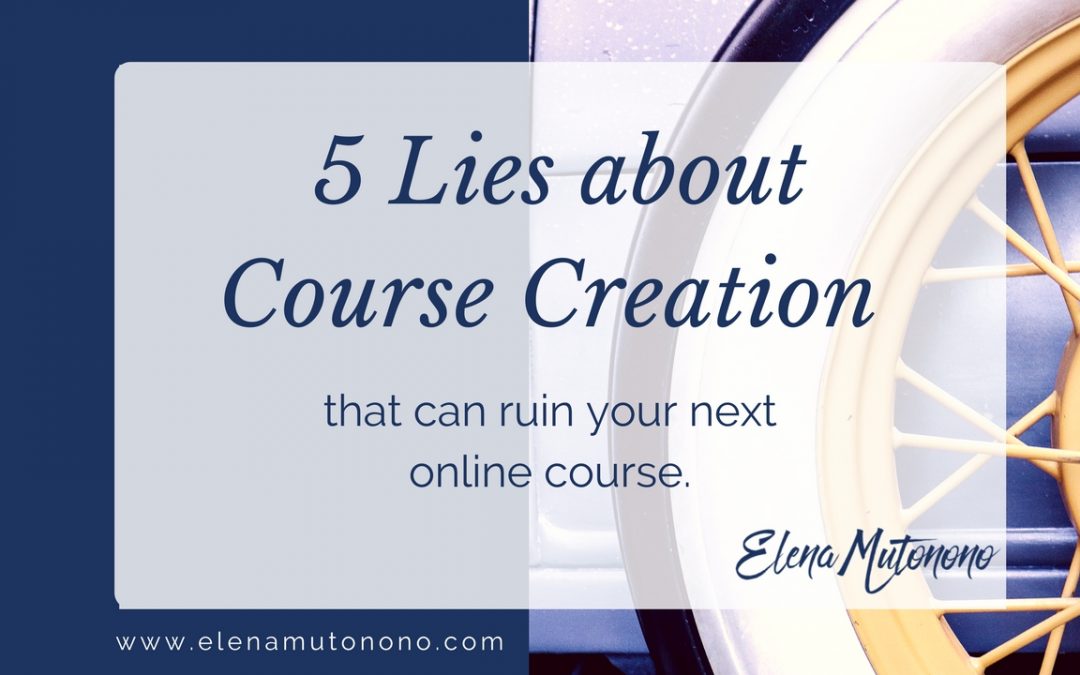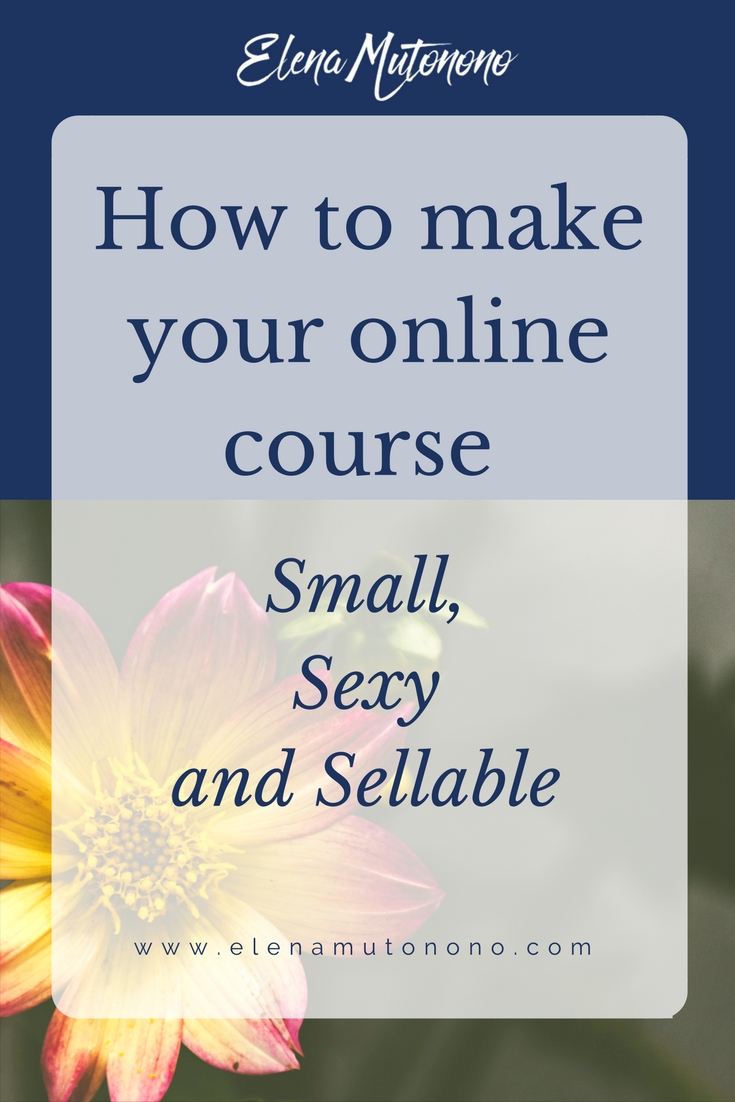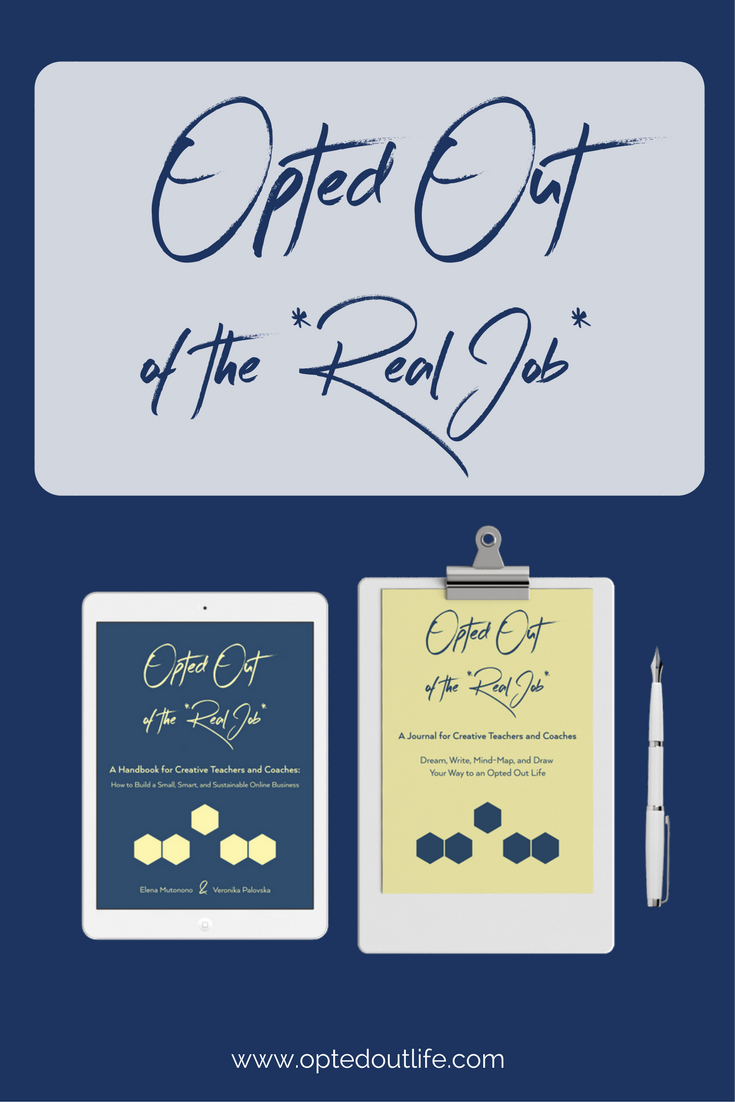I can’t believe it.
One more Facebook ad about a magic tip on how to create a course.
One more email with a request to focus less on the “core message and marketing,” but more on the “real meat,” like, what mic to use or what camera has a better angle or what platform charges less or what plugin calculates sales tax.
“I don’t really need to get back to my niche issue. I already know it, and it’s worked great for me, except I haven’t been able to sell this course. But you can help me, right? Just let me know how to set up an automated sequence, and that would be enough.”
If you feel like you’ve said or thought those things, don’t feel bad because I’ve thought them too. The number of hacks that floods our online reading feeds suggests that there’s definitely high demand on the how-to’s.
But hacks only scratch the surface. They make you focus on the wrong things.
Go deeper into #online #course creation. Reject these 5 lies to produce #content that transforms.Click To Tweet
That is, until you actually start putting things together, and you’ll realize nobody really cares about the angle of your camera and the specs of your mic (as long as people can see and hear you). What they’re after is results.
- Your challenge will be to go beyond a regular course with so-many lectures, quizzes and worksheets.
- Your challenge will be to create a learning environment that transforms and changes a person’s life.
To create a remarkable course you’ll need to switch your focus from monotonous exercises to meaningful experiences, from populating hacks to cultivating habits, from *patching* everyone with a quick-fix band-aid to uncovering the pain and applying deep-wound treatment.
And you’ll need to stop believing these 5 lies I’m about to share with you.
So after you’re done reading you’ll have to run a few reality checks before you create a course. Here’s what I’m talking about.
Lie #1: You need to create and sell a signature course if you want to transform your business.
First of all, you don’t need to create a course. A lot of entrepreneurs who teach online create VIP programs/coaching experiences and they don’t exactly need courses. Dig deeper into your business model and ask yourself if a course is what you need.
One more thing to get straight here: your very first course isn’t exactly going to be your signature course.
- You don’t know your audience yet (and no, your 5,000 instagram followers aren’t exactly your course participants. Some of them are, maybe 5, but the rest – forget it >> see below).
- You aren’t particularly sure how to shape your message and what niche it occupies.
Hence, never make your first course large and bulky and exhaustive. Here’re your creative solutions:
- Create a small product instead (here’s how I put together my mini-course on Udemy).
- Get to know your audience.
- Receive feedback (more ideas on what to do after the launch).
- Design a pilot program.course.
- Weed out glitches after you run it 2-3 times.
Then you can begin making it into a signature course.
Lie #2: You will make lots of money from the course.
I know, I know. I’ve seen people talk about their course taking off and selling like hot cakes, but what they don’t usually say (maybe because they run out of words in their Facebook ad) is what helped them sell that course:
- A large community of fans
- A bit of help from “influencers” in their industry
- A new market with few training resources in one place
- A unique and classy brand
It is unusual to make a lot of sales on your very first try. People need to know you, like you and trust you, and that doesn’t happen without some support, validation or reputation you earn as a consistent content creator.
The question you need to ask yourself is, “Has this course helped me win the people I didn’t know as my customers?”
In other words, if you get anyone outside of your family and circle of high school buddies to buy your course or e-book, you have a huge success. You have managed to share the content so valuable that a person from a faraway corner of the world pulled out the money and paid you for your course.
This should be your goal, not the 5- or 6-figures.
Lie #3: I need to know how to design, what tools to use and where to host a course to make it successful.
You do, but that’s not it. Don’t ever think that just by “building it” they (your ideal clients) will come and buy. It does happen, no doubt, but there’re more things to consider.
When you buy from someone online, do you ever say, “wow, I like their logo. I think I should buy this course on how to cook meals in 30 minutes from them because their logo is great.”
While those factors may be important to some it would be silly to think of them as our determining factors.
So don’t obsess so much with the tools and the looks only, think of your marketing.
In fact, your marketing doesn’t end the day you launch your course. It has to get more powerful after the course is there, after you start getting your feedback and changing your copy, addressing the pain and explaining why your brand new course will solve it better than others will.
I know that marketing isn’t easy. I wonder if sometimes we hide behind “figuring-out-the-hacks” so we don’t have to market ourselves. If you find yourself feeling like a jerk when it comes to marketing, you’re not alone. But this can be easily overcome when you reframe the way you think of marketing.
Here’re several helpful posts:
- How to be your own marketer, and not a jerk by yours truly.
- How to self-promote without feeling arrogant and salesy by Veronika Palovska
Lie #4: I don’t have to worry about marketing as long as I have thousands of followers on social media.
Followers won’t buy from you until they feel like they’re a part of the community.
A community is a group of people that shares a set of beliefs, values, interests and goals.
I want to emphasize the word shares in this definition (and here I don’t mean retweeting). When people share, they give what they have to create benefit for everyone. What I have may be more than what you have, but when we put it together, we benefit manifold.
The best way for you to build community is to create and share valuable content through email. I talked about it in greater detail in my interview at the Online Teacher’s Summit* this year. Followers are fleeting and not loyal. Subscribers are your clan, your tribe, your fans.
So spend your time creating and sharing content in a meaningful way. Encourage people to think differently. Motivate them on their journey. Share from your wealth of knowledge.
So invite your social media followers to sign up for your weekly updates and then share your remarkable content consistently. You will eventually sell your product to them, without feeling like a desperate realtor trying to make one more sale before the end of the month and forcing you to buy what you hate.
More excellent reading on this subject:
- Don’t ask them to marry you before the first date by Jessica Wicks
- Trust building 101: How to show the world that you take your biz seriously by Veronika Palvoska
- Everything is marketing by Alexandra Franzen (P.S. Be sure to check out the links in her posts, too, they’re really motivational!)
*This is an affiliate link disclosure. If you click it and choose to buy the premium pass to the Online Teacher’s Summit, featuring yours truly along with 29 other excellent online educators, you’re investing into your own online business and giving me a small gift that will support my caffeine habit, for which I’m super thankful!
Lie #5: My course will be my passive income.
Passive isn’t always really passive. Think of language learning. Even if you say you know some language passively, it means you have done some work to make it passive. Also, without continued work (even basic maintenance) passive knowledge may disappear.
Your course (if done right in the first place) will make your work smarter and allow your business to breathe so you don’t always depend on 1:1 services, but it will need work.
Now after a few years, unless you’re a hardcore “solopreneur,” you will find people to help you do that work, and you will be able to spend some time on the beach, completely unplugged while someone else is tracking sales, creating reports, answering inquires and providing support.
Over time your “baby” will grow and will need less of you, but if you want it to continue making an impact, you will have to be there to cast vision and decide on what needs to be improved.
Your course is never going to be completely passive, not in the first years anyway, so forget it and get ready to do some deep and meaningful work.
Why your #online #course isn't a #passive #income source: 5 lies to avoid when teaching onlineClick To Tweet
More reading on passive income:
- Most ridiculous passive myths busted by Farideh Ceaser.
- The underpants myth by Paul Jarvis.
In conclusion
There’s no magic bullet to create and launch your first course. You can’t invest into a “fruit company” and then not worry about anything for the rest of your life (extra points if you know the movie I just referenced). There’s more work that goes into creating a tranformational experience.
The hardest part about creating a course is finding that 1 pain that your client has and helping them overcome it. I run coaching sessions just to help coaches and entreperneuers like you to launch their courses and products (read Shanthi’s case study here).
But coaching sessions may not work for everyone (and, as with any 1:1, the availability is limited).
Still, you can get plenty of actionable advice and training through my Smart Teacher’s Library, that includes trainings, the forum, monthly challenges with webinars and Monday-Friday access to my brain.
This is a unique platform for coaches and entrepreneurs who want to teach online – a supportive community with highly actionable training sessions and resources, all in one place. My renewable monthly add-ons will motivate you to actually apply what you’ve been learning.
Win-win.
You can join now for a small fee and stay for as long as you want to. Let’s build your next course together!
Please, share in the comments:
- Have you created an online course?
- What problems have you encountered?
- What is the most challenging for you when it comes to course creation?
Thank you for tuning in and if you found these tips helpful, please share them with your audience! ~ Elena <3
P.S. The quote that I referenced is from Forrest Gump movie when he was referring to Apple computers (and you can watch the clip here):
“Lieutenant Dan got me invested in some kind of fruit company. So then I got a call from him, saying we don’t have to worry about money no more. And I said, that’s good! One less thing.”



 Welcome to my nook where *Big Magic* happens. My name is Elena Mutonono, I help small business owners package their services as digital products and sell them online. I want you to work smarter, not harder. Increase your impact beyond your current face-to-face clients. Grow your business as you reach more people all over the world.
Welcome to my nook where *Big Magic* happens. My name is Elena Mutonono, I help small business owners package their services as digital products and sell them online. I want you to work smarter, not harder. Increase your impact beyond your current face-to-face clients. Grow your business as you reach more people all over the world.








Friendly reading to get closer to my aim of overcoming my fear of online marketing. I’m grateful I found you at the Online Teacher Summit.
Ana, thanks for your kind words. OTS was a lot of fun, and I’ve received a lot of positive feedback from some of the participants. Growing together this year is going to be fun!
I love these tips! I’m learning so much from you – this newbie is delighted to have you as part of Blogging for Education and delighted to be in your group Opted Out! Thank you!
Thanks, Heidi! Glad to be a part of your community, too, and thanks for joining Opted Out.